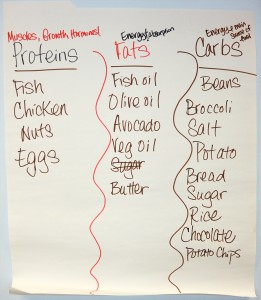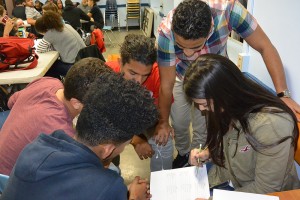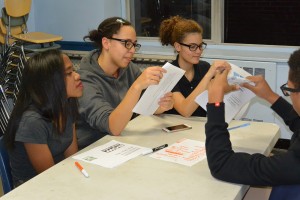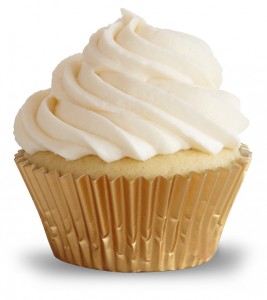by Ruby Lyon
Eating nutritious food, getting enough sleep, and drinking plenty of water is important for everyone. At Row New York, we know it’s incredibly relevant for student athletes. They must eat correctly to perform optimally during workouts and on race days. Throughout December, we focused on nutrition awareness and its effect on our bodies.
 Our workshops began with the foundations of food and understanding how to read nutrition labels. Students identified the three basic food groups: carbs, fats, and proteins. For many participants, knowing which category an item fell into wasn’t always intuitive. They would ask, “what happens when it’s fried chicken? Is that a protein or fat?” Instructors worked to answer the simple questions that are so important to healthy eating. We learned how carbs break down into sugars and fuel the body during physical activity. And then, how that same sugar becomes fat when it’s consumed in excess. We then turned to our hands to learn about portion sizes. A serving size of healthy fats (e.g. nuts, olive oil, avocados, fatty fish, etc.), is approximately the size of one thumb. A lean meat serving should be limited to the size of a palm. Vegetables and fruits? A whole fistful!
Our workshops began with the foundations of food and understanding how to read nutrition labels. Students identified the three basic food groups: carbs, fats, and proteins. For many participants, knowing which category an item fell into wasn’t always intuitive. They would ask, “what happens when it’s fried chicken? Is that a protein or fat?” Instructors worked to answer the simple questions that are so important to healthy eating. We learned how carbs break down into sugars and fuel the body during physical activity. And then, how that same sugar becomes fat when it’s consumed in excess. We then turned to our hands to learn about portion sizes. A serving size of healthy fats (e.g. nuts, olive oil, avocados, fatty fish, etc.), is approximately the size of one thumb. A lean meat serving should be limited to the size of a palm. Vegetables and fruits? A whole fistful!
In workshops targeted for older athletes, the discussion dived deeper into the benefits of nutrition and timing. As an athlete, you want to eat “clean” (unprocessed) foods often, stay hydrated, and make sure you are eating to recover after physical activity. Healthy snacks throughout the day help with performance, but to also maintain a great mindset. If meals are skipped, or spaced too far apart, the result can be energy crashes and consequently, mood swings. We then covered the idea of “eating the rainbow.” Vitamin C for example, found in red and orange produce, facilitates the healing process after strenuous workouts. Amazingly, one red bell pepper provides 380% the recommended daily value.

When it came to discussing the importance of sleep and eating breakfast, many students were surprised to find out they needed more of both. It is recommended that we get 8 hours of sleep per night. When students were asked if they had 5 or less hours of sleep the night before, 4 seniors raised their hands. Less than 8? Most of the room shot their hands up. For breakfast, a lot of high schoolers admitted to skipping it completely, or eating a very small meal. Increasing metabolism, fueling the brain, and providing energy to start the day, breakfast is a must have for rowers. Although breakfast and sleep are easy to cut out, we hope students realize how both will help them improve as athletes.
Many people know the stereotype of weightlifters at the gym pounding protein. Why do they do that? Protein is the building block for muscles. As we lift weights, run, row, and engage in physical activity, our muscles develop small tears (from blood rushing into them). Protein helps repair these tears, thus making our muscles stronger and bigger. Therefore, the timing of meals plays an important role in preparing and maintaining our bodies for pre and post workouts. Using a worksheet with a variety of food items, students were tasked with developing meals for different scenarios, such as breakfast, pre-workout, pre-race, and post race. A hidden challenge was keeping the meals under $10. By systematically choosing foods after their nutrition lesson, students left with a solidified understanding of how to create meals that serve their active lifestyle.
Bringing awareness to daily meal choices, sleeping habits, and the how nutrition affects an athlete’s performance was an eye opening experience for students. As I asked students if there was anything they were going to change, the answers were varied. Some planned on drinking more water, eating more red fruit, consuming more protein, and most were considering how to improve pre and post race meals. Another takeaway from the workshop was the 80/20 rule. Try your best to eat healthy and be on top of nutrition 80% of the time. The other 20%, enjoy life, eat a cupcake or two!







